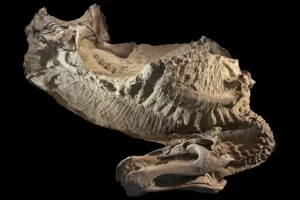Wyoming Psychiatric Hospital Grapples With Patient Waitlist
State hospital competes with private sector to recruit nurses
- Published In: Other News & Features
- Last Updated: Aug 23, 2023

The Wyoming State Hospital in Evanston is grappling with a waitlist of patients from throughout Wyoming seeking treatment. Part of the problem is due to competition from the private sector for nurses. (Courtesy photo from the Wyoming Department of Health)
By Alec Klein
Special to the Wyoming Truth
The Wyoming State Hospital, the only state-operated psychiatric hospital, is grappling with a waitlist of patients from throughout Wyoming seeking treatment. But part of the problem is coming from an unexpected place: Competition from the private sector for coveted nurses.
A shortage of beds is often cited as the reason for the perennial waitlist. But the state hospital can only accommodate so many patients, depending on its staffing levels, to ensure safe and proper treatment.
“Staffing is crucial,” said Paul Mullenax, the Wyoming State Hospital administrator, in a wide-ranging interview with the Wyoming Truth yesterday. “It determines how many patients we can have at the facility.”
Mullenax said the state hospital’s waitlist includes 30 forensic patients, those who have been charged with a crime and have been evaluated to be in need of mental health treatment.
The waitlist at the state hospital came into sharp relief recently with the case of Jeremiah Sinarski, who weeks ago had been screaming day and night in the Teton County Jail, railing at no one in particular, sources said. He had been arrested for driving while under the influence of alcohol, records show. A local judge had ordered a mental health evaluation of Sinarski, who has been in and out of Jackson jails for a series of run-ins with the law due to his mental illness and alcohol addiction, according to court records and his attorney.
Sinarski’s case followed that of another inmate, Dennis Gross, who last year had spent over nine months in the Jackson jail after being arrested for allegedly lighting a fire and stopping firefighters from putting out the flames, according to police reports. In yet another case, Riley Sills, a Teton County resident, was jailed for half a year before gaining admittance to the state hospital.
What’s happening in Jackson is part of a broader national phenomenon. People with mental illness are often languishing in jails throughout the country, leaving them with little to no treatment. The problem in prisons has become so well-documented that it’s known nationwide as “warehousing” the mentally ill.
But the waitlist of patients in need of treatment at the Wyoming State Hospital isn’t only confined to those facing criminal charges. There are also 18 people on the waitlist for involuntary civil commitments because they are deemed a danger to themselves or others.
The state hospital, part of the Wyoming Department of Health’s Behavioral Health Division, only has enough staffers to safely accommodate 80 patients, and there are 79 patients now, said Mullenax, the hospital administrator. That’s out of a total of 104 inpatient beds at the sprawling 140,000-square-foot facility in Evanston, which sits in the shadow of the Uinta Mountain range near the Utah border.
The state hospital also is contending with another patient population—those who have been adjudicated not guilty of criminal charges, but have been sent to the hospital for treatment. Those individuals can end up as patients in the hospital for months, if not years, Mullenax said. There are now 11 such patients, which accounts for just over a third of the 32 beds set aside for forensic patients who have been charged with a crime.
The backlog has actually improved lately at the state hospital; several months ago, the hospital was accommodating about 70 patients. A couple of months ago, that number rose to about 80.
That improvement comes on top of the state hospital’s move in 2020 to its new facility, which helped to consolidate its services, which had been spread among eight buildings, into one campus, creating efficiencies. For instance, there’s no longer a need to drive between buildings. The recently renovated facility not only houses patient-care units but offers other support, such as dietary, housekeeping and laundry services.
But for all the improvements, Mullenax said, “We are still struggling with the recruitment of nurses.”
Stiff competition
This is a perennial problem not just for the state hospital but for many facilities throughout Wyoming, Mullenax explained. One of the many impacts of COVID-19 was to send nursing salaries skyrocketing, even as many left the profession in the wake of the pandemic.
Compounding the problem, the Wyoming State Hospital is also competing with private hospitals for the limited number of available nurses. “The government sometimes struggles to compete with the private sector,” Mullenax acknowledged.
The private sector, however, may have greater resources at its disposal, as it is luring nurses with such incentives as higher sign-on bonuses, increased retention payments and even by helping them pay back costly student loans. Sometimes, the state hospital also runs into recruitment challenges among those who are reluctant to move to Evanston, a city with a population of about 11,000 people.
But the state hospital is responding to the competition. Mullenax said it made a request for the state budget session in January, seeking funds for recruitment and retention. That includes asking for funds to offer nurses some loan repayments. Of the state hospital’s annual budget of about $36 million, he said, “We are budgeted appropriately.”
Meanwhile, some jails throughout the state remain in a holding pattern, waiting for the state hospital to be able to accommodate more patients. Mullenax said such jails are in a “difficult spot” and “We share their frustrations” with the waitlist, but he said that they could always consult with his medical staffers to talk through recommended actions and possible medication for those who are incarcerated.
Mullenax noted that the state hospital’s waitlists have been declining, a positive trend that he attributes in part to community health centers that have been quicker to identify mental health issues.
At the same time, though, Mullenax, who has worked at the hospital for 29 years, the last three as the administrator, said mental health issues remain a perennial problem in society.
“I don’t think it’s a decreasing issue,” he said.
To that end, Mullenax said the state is working with community mental health centers on mental health reforms, and he anticipates that will lead to more services being provided to the community.
But the challenges facing the state hospital remain nuanced and complex. It’s not like a hospital seeking to mend a patient’s physical ailment or illness, Mullenax said, which can often be evaluated and fixed in a certain amount of time. When it comes to “restoration” from mental illnesses, Mullenax said, there is no exactitude.
“It takes different amounts of time for people to be restored,” he said. That restoration process could take 30 days, for instance, or longer. But he said, “It’s not like a wound that’s stapled up and healed in three days.”













